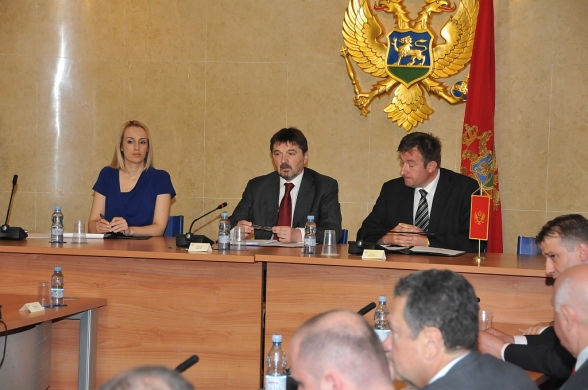Members of the Committee on International Relations and Emigrants held a meeting today with representatives of multiple associations of emigrants from Montenegro.
At the very constructive meeting, the first of this type since the Committee for International Relations and Emigrants was constituted, the chairperson Mr Miodrag Vuković pointed out the significance of organising similar events in order to bring closer and connect numerous Diasporas from Montenegro with the home country. Mr Vuković said that it was necessary to recognise potential of contribution of “the second Montenegro that exists outside of borders of Montenegro”. He reminded that the Parliament of Montenegro established the Committee on International Relations and Emigrants as a separate Working Body, thus recognising the importance of the issue of Montenegro’s diaspora.
All the members of Delegation took active part in the dialogue with the members of the Committee, exposing the existing problems of organising diaspora and the need to establish an actual communication with the homeland. They stressed that the human, economic and cultural potentials of diaspora are great, but underutilised. Speaking of the need to establish a closer cooperation, they emphasised the necessity of better communication in order for the emigrants to be better integrated in the whole social, economic and political life of Montenegro. They placed special emphasis on investment potential of our emigrants, which is still not being adequately utilised. During the detailed presentation of challenges and chances for improvement of connections with diaspora, they also spoke on the issue of dual citizenship, possibilities of opening consular representative bodies in certain countries, removing business barriers, census of emigrants and creating an accurate database, as well as on the possibilities of establishing a cultural and scientific cooperation between Montenegro and other countries where a significant number of Montenegrin emigrants live.
Members of the Committee on International Relations and Emigrants agreed that our country needs to recognise the potential of its diaspora, and that the activities such as establishing Administration for Emigrants is one of the actual steps toward a common goal – promotion of relations and strengthening mutual connections. Recognising diaspora as a significant developmental and humanitarian resource, as well as a resource for promotion of regional cooperation, and cooperation with the EU and other countries, it was emphasised that the care for diaspora is an integral part of internal and foreign policies of Montenegro. Stating a positive relation when it comes to connection of Montenegro and emigrants, the MPs pointed out that the common task and obligation is the building of a unique diaspora of multi-ethnic and multi-religious harmony. Additionally, the members of the Committee informed their guests that the activities regarding conception and adoption of Platform for cooperation of the Committee with the emigrants are underway. It represents an actual contribution of this working body of the Parliament of Montenegro in solving various issues and problems regarding the emigrants from Montenegro.
Representatives of the emigrants and members of the Committee agreed that the meeting represented grounds for establishing a cooperation that needs to be utilised to establish the continuity thereof. With that regard, it was concluded that the meetings with the emigrants need to become common practice in the Committee’s activities.









